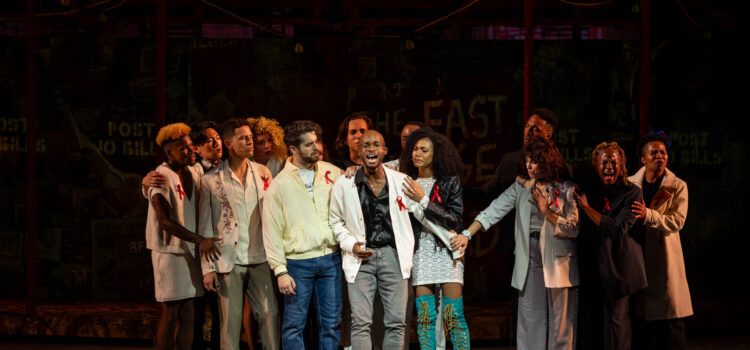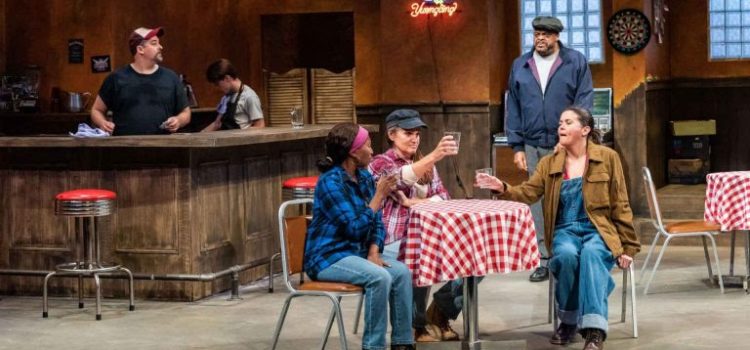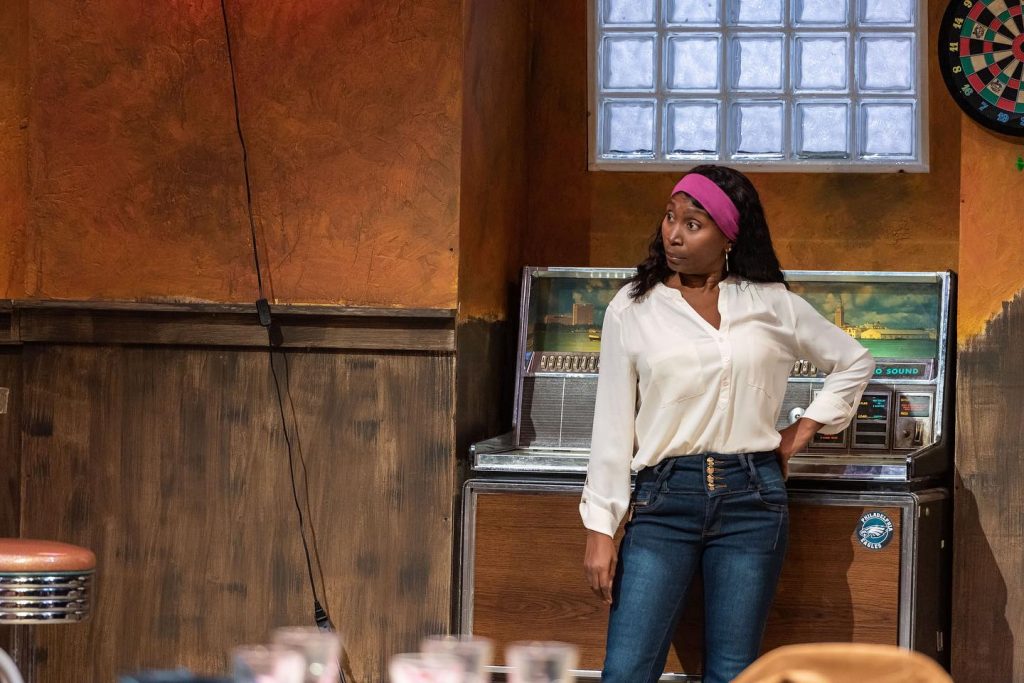By Lynn Venhaus
Measure your life in love.
Simple advice from Jonathan Larson, the musical genius behind the “Rent” phenomenon, whose tragic death on Jan. 25, 1996 – from an undiagnosed aortic aneurysm, after the final dress rehearsal, meant he never saw the impact his words and music had worldwide. He ran out of time, but his life’s work lives on forever.
Especially the part about how we can’t control our destiny. That underlying poignancy is part of the passion and the power of his landmark rock opera that finally graces the Muny stage 27 years after it produced a seismic shift in popular culture.
It’s time, and the Muny makes the most of those moments so dear in a grand staging that honors Larson’s compassionate vision with the dramatic operatic scale this modern take on Giacomo Puccini’s “La Boheme” deserves.
A celebration full of life, this touchstone production’s creative team is exactly the right fit, showcasing tender beauty and pure joy. Director Lili-Anne Brown, who brought us the exceptional “The Color Purple” last year, focuses on the humanity, dignity and acceptance that is such a potent part of this revolutionary musical.
Set in the “Alphabet City” part of New York City’s East Village, over the course of one year, impoverished young artists and outcasts live through the HIV/AIDS epidemic during the late 1980s, choosing to love over fear. This cast maintains the raw, realistic appeal, making sure it rings true.
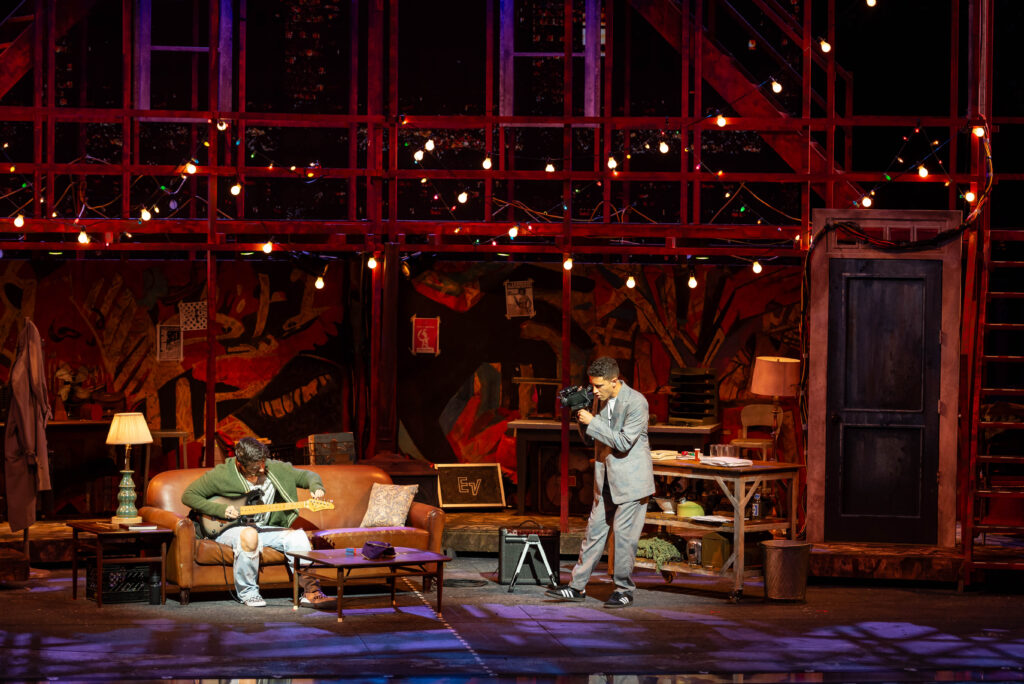
The eight principal performers make an indelible impression, their vitality thrilling to witness, and their luxurious vocals a testament to their talent and technical skills. “You’ll See,” “No Day but Today,” and “Will I?” with strong supporting cast mates become earworms that will stay in your mind for days.
When their vocal prowess is spotlighted through Jermaine Hill’s vibrant music direction – what an exhilarating job the orchestra does! – it’s wondrous.
Hill was a part of the stellar “The Color Purple” collaborators, as were scenic designer Arnel Sancianco, who has fashioned a striking movable apartment building tower, and video designer Paul Deziel, whose work stands out, with Mark’s cinema verité footage and the humorous bits of celebrity minutia in the news scroll.
Vincent Kempski is a dynamic Roger, bringing the grit and rock musician edge to “One Song Glory” and “Your Eyes.” He and Lincoln Clauss, as documentary filmmaker Mark, are a comfortable pair of roommates, with effective bravado in “Rent” and “What You Own.” Clauss was a memorable Tobias in last summer’s “Sweeney Todd,” and leads as the pragmatic narrator here.
Sparks fly when Ashley De La Rosa, as drug-addicted exotic dancer Mimi, meets Roger, and their duets are superb: “Light My Candle” and “Without You” especially. She exhibits a confident demeanor, rocking the over-the-knee turquoise patent leather boots and smoothly gliding around the stage to choreographer Breon Arzell’s moves.

Adrian Villegas perfectly embodies the life force that is flamboyant one-of-a-kind drag queen Angel Dumott Schunard, delightful in “Today 4 U.” As scene-stealing as they are, what’s most remarkable is Terrance Johnson’s heart-is-full portrayal of philosophical tech-savvy activist-professor Tom Collins, who falls in love with Angel.
He was brought in to assume the role because the original cast member Evan Tyrone Martin took ill. Johnson and Villegas appear like they’ve been doing the show together for a long time, duet on a heartfelt “I’ll Cover You” and with others for a spirited “Happy New Year.” And Johnson’s vocals on “Santa Fe” and solo snippets in other songs are sumptuous.
Lindsay Heather Pearce, who played Elphaba in “Wicked” on Broadway, can belt with the best of them, and shows it on live-wire performance artist Maureen’s “Over the Moon” and “Take Me or Leave Me.” Tre Frazier has the thankless task of playing sellout Benjamin Coffin III, friend turned foe.
Special shout-out to ensemble-mates Julia Yameen (Mark’s mom), Shelby Brown (Joanne’s mom), Jhardon Dishon Milton (Joanne’s dad), and Erica Stephan (Roger’s Mom) as the parents heard on the voice mails.
Among the many highlights is “La Vie Boheme,” the ebullient, defiant Act 1 closer that features characters finding their voices in a number that defines community. And fun name drops! (Pee-wee Herman!).

After intermission, when you hear the iconic piano chords and the entire ensemble files out to present the signature song, “Seasons of Love,” it is delivered with tremendous strength and feeling, creating a sublime contemporary “Muny Moment.” I will admit to moist eyes. Just hearing the divine Anastacia McCleskey crush that power-ballad solo, her voice ascending into the stratosphere, is goosebumps-time.
As Celie in last summer’s “The Color Purple,” she won the Outstanding Lead Actress in a Musical Award from the St. Louis Theater Circle in April. She plays Maureen’s attorney girlfriend Joanne Jefferson with genuine charm.
Costume designer Raquel Adorno has outfitted the cast appropriately in era streetwear, but my only quibble is I miss Mark’s maroon and blue sweater with his striped scarf. At times, it was hard to keep Mark and Roger separate. But Angel’s glitzy attire was eye-popping.
The sound had issues when the music was louder than the performers, where I was sitting, but I wondered if it was better elsewhere in the amphitheater.
Those people not familiar with the show could have had trouble figuring out action, so I recommend reading up on the show beforehand. I finally saw Puccini’s opera a few years ago, and was struck at how closely it resembled the “Rent” characters, except in a different century and country – Paris in 1830. The life-and-death themes, nevertheless, are universal.

While AIDS is no longer a death sentence, that period of uncertainty was harrowing and horrifying, and Larson’s stark look at loss – and homophobia — still resonates.
The show captured a specific time and place, but its pathos was always identifiable. After all, we’ve just been through several years of a devastating global health emergency and are currently losing thousands to an opioid crisis.
As a struggling artist for years, Larson knew the world he wrote about, based on a concept by Billy Aronson. Among his legacy, he urged us to cherish each of the 525,600 minutes we’re given every non-Leap year. Posthumously, Larson went on to win the Pulitzer Prize for Drama and three Tony Awards (musical, book, score).
“Rent” ran for 12 years on Broadway, has had countless touring shows for 25 years, a 2005 film adaptation, and a live television presentation in 2019.
No matter how many times I hear this score (and I know every word after heavy playlist rotation of the original Broadway cast double-CD recording), I am moved by how timeless each song is.
We are living in the Twilight Zone, only now America is well past the millennium. If we are fortunate, we know love and appreciate friends.
This exceptional cast makes us feel each emotion expressed, and I mean really feel the connections with an unmistakable chemistry and a reverence for the material.
The eight principals who moved to Broadway’s Nederlander Theatre April 29, 1996, were lightning in a bottle: Anthony Rapp as Mark Cohen, Adam Pascal as Roger Davis, Daphne Rubin-Vega as Mimi Marquez, Tony winner Wilson Jermaine Heredia as Angel, Jesse L. Martin as Tom Collins, Idina Menzel as Maureen Johnson, and the more ‘outsider’ characters –Fredi Walker as Joanne Jefferson and Taye Diggs as Benjamin Coffin III.
They caused a commotion, inspiring devotion. Their performances made the ordinary extraordinary and galvanized a generation. They changed their lives, and in the process, other Gen Xers.
They made it possible for others, especially ones who go against the grain, to be an “us” instead of a “them.”
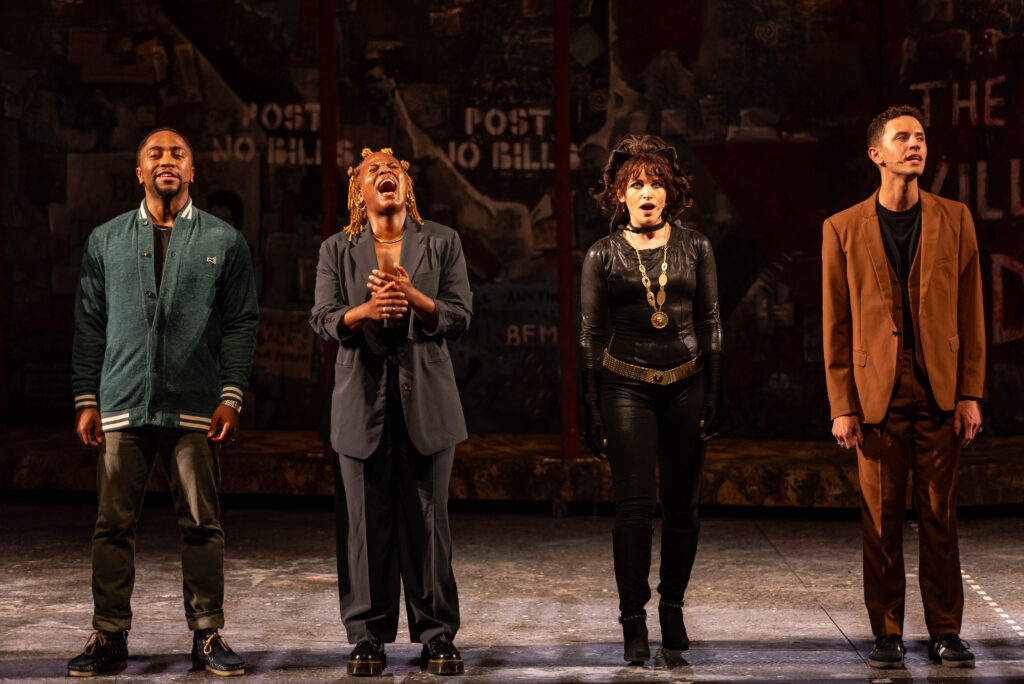
Cut to 2023, and Gen Zers are now post-9/11 babies. Can “Rent” still strike a chord? It may no longer shock, but it can awe.
“Rent” still matters. It has the ability to connect on a personal level for all sorts of different reasons.
Take it from me, a Boomer Rent-head who saw it live on its first national tour, shared it with my oldest son as he entered his 20s, and consider the night I saw Anthony Rapp and Adam Pascal reprise their roles in 2009 one of the best nights of live theater ever (the electricity and the energy was off-the-charts). I’ve seen it so many times, I’ve lost count. I think it’s 11, and until the Muny Saturday night, I hadn’t seen a professional company perform it since the 20th anniversary tour in 2016. That music still holds a spell.
The Muny production is a triumph in every way, giving oxygen to an eternal flame, and a rite of passage, moving the cultural institution forward. Watching it under a moonlit sky was glorious, a stirring shared experience with thousands of other Rent-heads and a captivated Muny audience.
As Larson reminds us, there really is no day but today, as life is ours to miss.

The Muny presents “Rent” Aug. 4-10 nightly at 8:15 p.m. on the outdoor stage in Forest Park. For more information, visit www.muny.org.
(Notes: For more about Jonathan Larson, see the 2021 musical film “Tick, Tick…Boom!” currently streaming on Netflix. Directed by Lin-Manuel Miranda, who said “Rent” changed his life when he first saw it as a teenager, it features an Oscar-nominated performance by Andrew Garfield as the young songwriter trying to get noticed.
Anthony Rapp’s 2006 book “Without You: A Memoir of Love, Loss, and the Musical Rent” is a worthy read.)
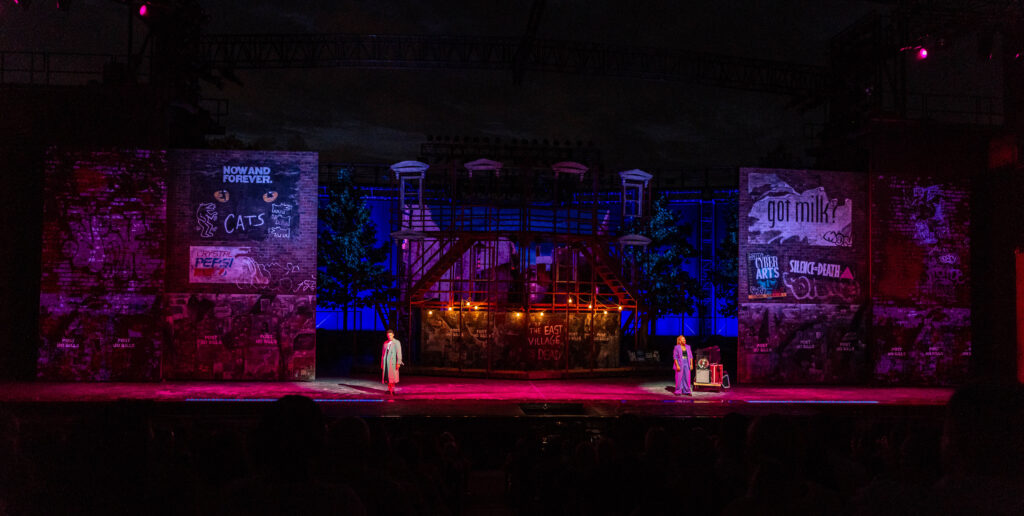

Lynn (Zipfel) Venhaus has had a continuous byline in St. Louis metro region publications since 1978. She writes features and news for Belleville News-Democrat and contributes to St. Louis magazine and other publications.
She is a Rotten Tomatoes-approved film critic, currently reviews films for Webster-Kirkwood Times and KTRS Radio, covers entertainment for PopLifeSTL.com and co-hosts podcast PopLifeSTL.com…Presents.
She is a member of Critics Choice Association, where she serves on the women’s and marketing committees; Alliance of Women Film Journalists; and on the board of the St. Louis Film Critics Association. She is a founding and board member of the St. Louis Theater Circle.
She is retired from teaching journalism/media as an adjunct college instructor.

